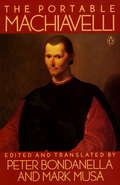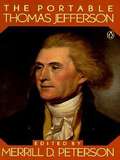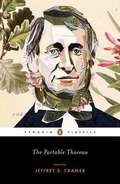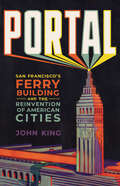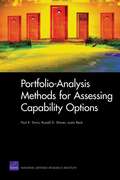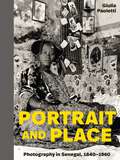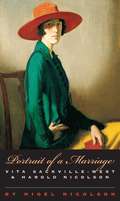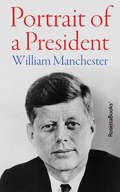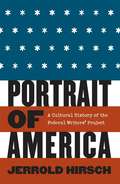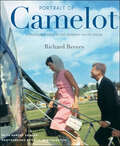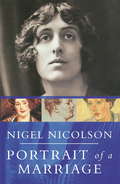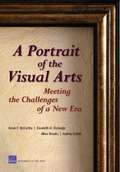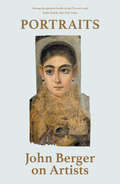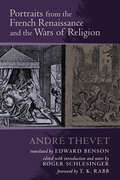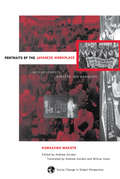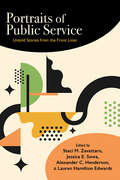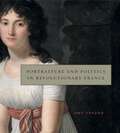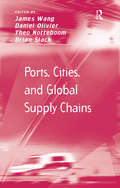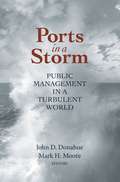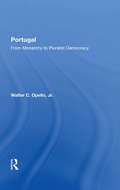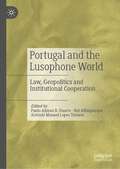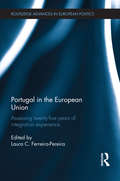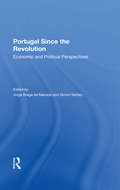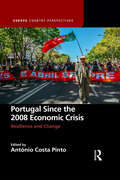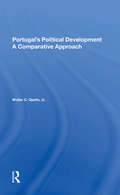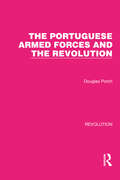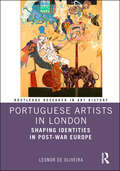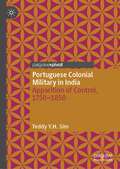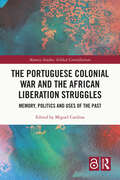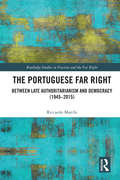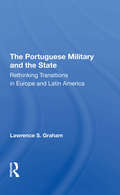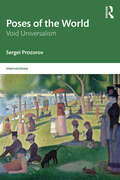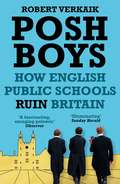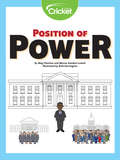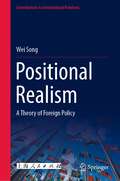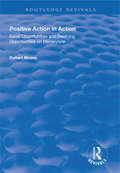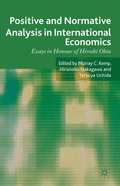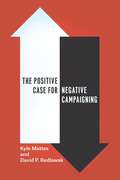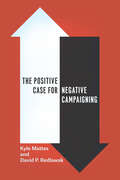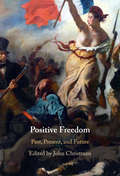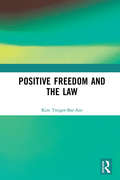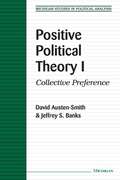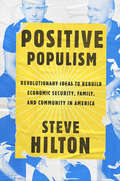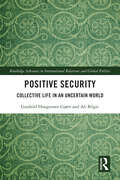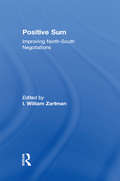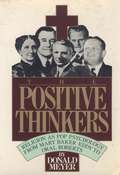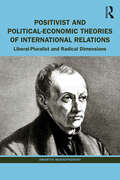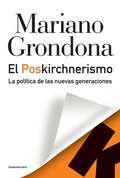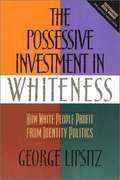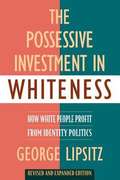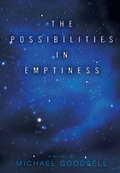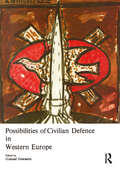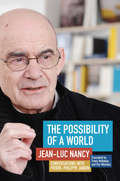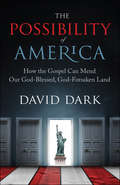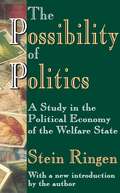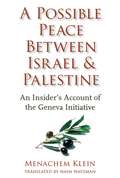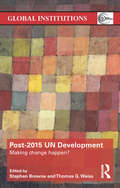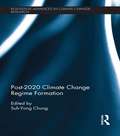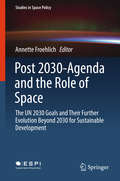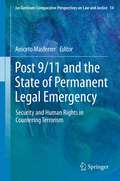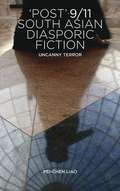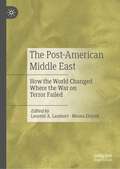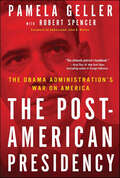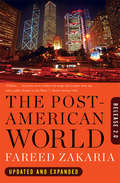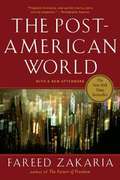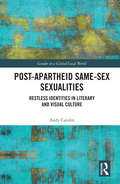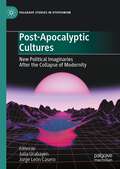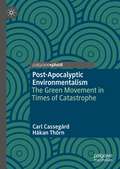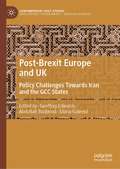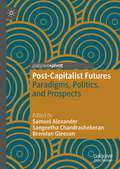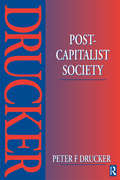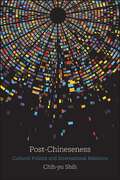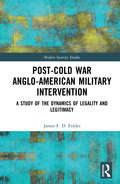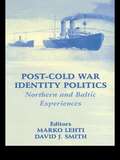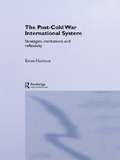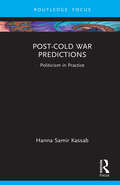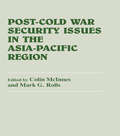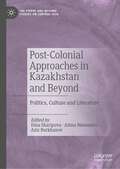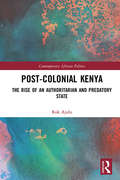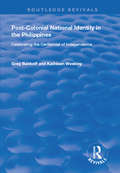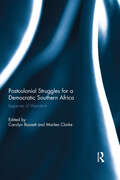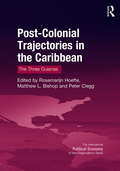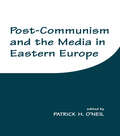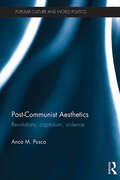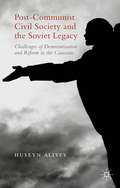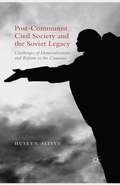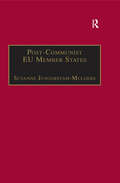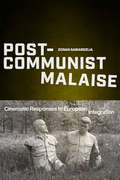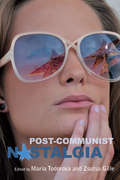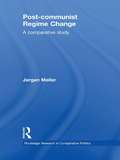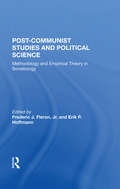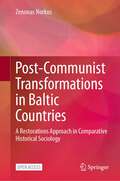- Table View
- List View
The Portable Machiavelli
by Niccolo Machiavelli Peter Bondanella Mark MusaIn the four and a half centuries since Machiavelli's death, no single and unanimously accepted interpretation of his ideas has succeeded in imposing itself upon the lively debate over the meaning of his works. Yet there has never been any doubt about the fundamental importance of Machiavelli's contribution to Western political theory. The Portable Machiavelli brings together the complete texts of The Prince, Belfagor, and Castruccio Castracani, newly translated by Peter Bondanella and Mark Musa especially for this volume. In addition, the editors include an abridged version of The Discourses; a play, The Mandrake Root, in its entirety; seven private letters; and selections from The Art of War and The History of Florence.
The Portable Thomas Jefferson
by Thomas JeffersonIncludes A Summary View of the Rights of British America and Notes on the State of Virginia complete; seventy-nine letters; "Response to the Citizens of Albemarle," 1790; "Opinion on the Constitutionality of a National Bank," 1791; and many other writings.
The Portable Thoreau
by Henry David Thoreau Jeffrey S. CramerHenry David Thoreau dedicated his life to preserving his freedom as a man and an artist. Nature was the fountainhead of his inspiration and his refuge from what he considered the follies of society. Heedless of his friends’ advice to live in a more orthodox manner, he determinedly pursued his own inner bent, which was that of a poet-philosopher, in prose and verse. Carl Bode brings together the best of Thoreau’s works in The Portable Thoreau, a comprehensive collection of the writings of a unique and profoundly influential American thinker. The complete texts of Thoreau’s classic works Walden and “Civil Disobedience,” as well as selections from The Maine Woods, Cape Cod, the Journal, and eighteen poems are included. Bode’s introduction rounds out this compact volume, offering a thorough and informative analysis of Thoreau and the forces that shaped his life and writing. “This compact book, containing infinite riches in a little room, is a simple setting for sound sense, nugget-like thought, the refined essences of a point of view” — St. Louis Post-Dispatch .
Portal: San Francisco's Ferry Building and the Reinvention of American Cities
by John KingA two-time Pulitzer finalist explores the story of American urban design through San Francisco’s iconic Ferry Building. Conceived in the Gilded Age, the Ferry Building opened in 1898 as San Francisco’s portal to the world—the terminus of the transcontinental railway and a showcase of civic ambition. In silent films and World’s Fair postcards, nothing said “San Francisco” more than its soaring clocktower. But as acclaimed architectural critic John King recounts in Portal, the rise of the automobile and double-deck freeways severed the city from its beloved structure and its waterfront—a connection that required generations to restore. King’s narrative spans the rise and fall and rebirth of the Ferry Building. Rich with feats of engineering and civic imagination, his story introduces colorful figures who fought to preserve the Ferry Building’s character (and the city’s soul)—from architect Arthur Page Brown and legendary columnist Herb Caen to poet Lawrence Ferlinghetti and Senator Dianne Feinstein. In King’s hands, the saga of the Ferry Building is a microcosm of a larger evolution along the waterfronts of cities everywhere. Portal traces the damage inflicted on historic neighborhoods and working dockyards by cars, highways, and top-down planning and “urban renewal.” But when an earthquake destroyed the Embarcadero Freeway, city residents seized the chance to reclaim their connection to the bay. Transporting readers across 125 years of history, this tour de force explores the tensions impacting urban infrastructure and public spaces, among them tourism, deindustrialization, development, and globalization. Portal culminates with a rich portrait of San Francisco’s vibrant esplanade today, visited by millions, even as sea level rise and earthquakes threaten a landmark that remains as vital as ever. A book for city lovers and visitors, architecture fans and pedestrians, Portal is essential reading for anyone interested in the history of San Francisco and the future of American cities.
Portfolio-Analysis Methods for Assessing Capability Options
by Russell D. Shaver Paul K. Davis Justin BeckAn analytical framework and methodology for capability-area reviews is described, along with new tools to support capabilities analysis and strategic-level defense planning in the Defense Department and the Services. BCOT generates and screens preliminary options, and the Portfolio-Analysis Tool (PAT) is used to evaluate options that pass screening. The concepts are illustrated with applications to Global Strike and Ballistic Missile Defense. Recommendations are made for further defense-planning research.
Portrait and Place: Photography in Senegal, 1840–1960
by Giulia PaolettiA richly illustrated history of photography in one of the epicenters of African modernityWhen the daguerreotype first arrived in sub-Saharan Africa in the early nineteenth century, local kingdoms still held power in Senegal and the French presence was limited to trading outposts along the coast. The pioneers of photography in Senegal worked within, across, and beyond the borders of colonial empire, expanding the medium&’s possibilities and contributing to a global visual language. Portrait and Place explores these unique encounters, providing an in-depth and nuanced look at the images made at the intersection of Black Atlantic, Islamic, and African cultures.Giulia Paoletti takes readers on a visual journey from the 1840s, when the oldest-surviving daguerreotype from West Africa was made, to the 1960s, when photography became the most popular medium as Senegal achieved its independence. She discusses some of Africa&’s most celebrated modernists, such as Mama Casset, and also offers insights into lesser-known photographers like Oumar Ka and once-anonymous figures such as Macky Kane. Paoletti examines both professional and amateur artists in genres ranging from portraiture to landscape and across media such as glass painting and lithography.Featuring a wealth of breathtaking images published here for the first time, Portrait and Place brings to life the important histories of photography on the African continent.
Portrait of a Marriage: Vita Sackville-West and Harold Nicolson
by Nigel NicolsonVita Sackville-West, novelist, poet, and biographer, is best known as the friend of Virginia Woolf, who transformed her into an androgynous time-traveler in Orlando. The story of Sackville-West's marriage to Harold Nicolson is one of intrigue and bewilderment. In Portrait of a Marriage, their son Nigel combines his mother's memoir with his own explanations and what he learned from their many letters. Even during her various love affairs with women, Vita maintained a loving marriage with Harold. Portrait of a Marriage presents an often misunderstood but always fascinating couple. "Portrait of a Marriage is as close to a cry from the heart as anybody writing in English in our time has come, and it is a cry that, once heard, is not likely ever to be forgotten. ... Unexpected and astonishing."--Brendan Gill, New Yorker. "The charm of this book lies in the elegance of its narration, the taste with which their son has managed to convey the real, enduring quality of his parents' love for each other."--Doris Grumbach, New Republic
Portrait of a President
by William ManchesterAn up-close look at John F. Kennedy by one of his closest confidants, a New York Times–bestselling biographer. Written by a prize-winning historian and biographer of such giants as Winston S. Churchill and Douglas MacArthur, this intimately detailed account provides a rare personal glimpse into the emotions behind the Kennedy administration—from the elation of victory to the frustrating challenges facing a young president at a pivotal turning point in US history. Originally published in 1962—before the assassination of JFK—Portrait of a President is William Manchester&’s first biography of the thirty-fifth president of the United States. In addition to firsthand encounters with JFK, the biography draws from over forty interviews conducted in the first year of his presidency. In speaking with those closest to the commander-in-chief, both in his administration and his family, Manchester captures a complete portrait of one of the most highly regarded figures of the twentieth century. This edition includes a new introduction and epilogue written by Manchester in the aftermath of November 1963, adding to the mythos by documenting not just how President Kennedy lived, but also the legacy he left behind.
Portrait of America
by Jerrold HirschHow well do we know our country? Whom do we include when we use the word "American"? These are not just contemporary issues but recurring questions Americans have asked themselves throughout their history--and questions that were addressed when, in 1935, the Roosevelt administration created the Federal Writers' Project (FWP) under the aegis of the Works Progress Administration. Although the immediate context of the FWP was work relief, national FWP officials developed programs that spoke to much larger and longer-standing debates over the nature of American identity and culture and the very definition of who was an American.Hirsch reviews the founding of the FWP and the significance of its American Guide series, considering the choices made by administrators who wanted to celebrate diversity as a positive aspect of American cultural identity. In his exploration of the FWP's other writings, Hirsch discusses the project's pioneering use of oral history in interviews with ordinary southerners, ex-slaves, ethnic minorities, and industrial workers. He also examines congressional critics of the FWP vision; the occasional opposition of local Federal Writers, especially in the South; and how the FWP's vision changed in response to the challenge of World War II. In the course of this study, Hirsch raises thought-provoking questions about the relationships between diversity and unity, government and culture, and, ultimately, culture and democracy.
Portrait of Camelot: A Thousand Days in the Kennedy White House
by Richard Reeves Harvey SawlerA revealing and intimate portrait of a president, husband, and father as seen through the lens of the first official White House photographer. Cecil Stoughton’s close rapport with President John F. Kennedy and First Lady Jacqueline Kennedy gave him extraordinary access to the Oval Office, the Kennedys’ private quarters and homes, state dinners, cabinet meetings, diplomatic trips, and family holidays. Drawing on Stoughton’s unparalleled body of photographs, most rarely or never before reproduced, and supported by a deeply thoughtful narrative by political historian Richard Reeves, Portrait of Camelot is an unprecedented portrayal of the power, politics, and warmly personal aspects of Camelot’s 1,036 days.“Reveals an intimate account of a very public figure…the rare archive of images features the president during state dinners and cabinet meetings at the White House to family holidays and vacations at their private homes.” —Vanity Fair
Portrait Of A Marriage: Vita Sackville-West and Harold Nicolson
by Nigel Nicolson MBE Vita Sackville-WestThe classic story of the relationship between Vita Sackville-West and Harold Nicolson, and a unique portrait of the Bloomsbury Group.'A brilliantly structured account of the dramas, infidelities and deep emotional attachments' GUARDIAN'An intimate and controversial account of his bisexual parents' open relationship' NEW YORK TIMES'One of the most absorbing stories, built around two very remarkable people, ever to stray from Gothic fiction into real life' TLSThe marriage was that between the two writers, Vita Sackville-West and Harold Nicolson and the portrait is drawn partly by Vita herself in an autobiography which she left behind at her death in 1962 and partly by her son, Nigel. It was one of the happiest and strangest marriages there has ever been. Both Vita and Harold were always in love with other people and each gave the other full liberty 'without enquiry or reproach', knowing that their love for each other would be unaffected and even strengthened by the crises which it survived. This account of their love story is now a modern classic.
Portrait Of A Marriage: Vita Sackville-West and Harold Nicolson
by Nigel Nicolson Vita Sackville-WestThe classic story of the relationship between Vita Sackville-West and Harold Nicolson, and a unique portrait of the Bloomsbury Group.'A brilliantly structured account of the dramas, infidelities and deep emotional attachments' GUARDIAN'An intimate and controversial account of his bisexual parents' open relationship' NEW YORK TIMES'One of the most absorbing stories, built around two very remarkable people, ever to stray from Gothic fiction into real life' TLSThe marriage was that between the two writers, Vita Sackville-West and Harold Nicolson and the portrait is drawn partly by Vita herself in an autobiography which she left behind at her death in 1962 and partly by her son, Nigel. It was one of the happiest and strangest marriages there has ever been. Both Vita and Harold were always in love with other people and each gave the other full liberty 'without enquiry or reproach', knowing that their love for each other would be unaffected and even strengthened by the crises which it survived. This account of their love story is now a modern classic.
A Portrait of the Visual Arts
by Andras Szanto Kevin F. Mccarthy Arthur Brooks Elizabeth Heneghan OndaatjeThe third in a series that examines the state of the arts in America, this analysis shows, in addition to lines around the block for special exhibits, well-paid superstar artists, flourishing university visual arts programs, and a global expansion of collectors, developments in the visual arts also tell a story of rapid, even seismic change, systemic imbalances, and dislocation.
Portraits
by John Berger Tom OvertonA major new book from one of the world's leading writers and art criticsJohn Berger, one of the world's most celebrated art writers, takes us through centuries of drawing and painting, revealing his lifelong fascination with a diverse cast of artists. In Portraits, Berger grounds the artists in their historical milieu in revolutionary ways, whether enlarging on the prehistoric paintings of the Chauvet caves or Cy Twombly's linguistic and pictorial play. In penetrating and singular prose, Berger presents entirely new ways of thinking about artists both canonized and obscure, from Rembrandt to Henry Moore, Jackson Pollock to Picasso. Throughout, Berger maintains the essential connection between politics, art and the wider study of culture. The result is an illuminating walk through many centuries of visual culture, from one of the contemporary world's most incisive critical voices.From the Hardcover edition.
Portraits from the French Renaissance and the Wars of Religion (Early Modern Studies #3)
by André ThevetAvailable for the first time in English, these thirteen selections from André Thevet’s Les vrais pourtraits et vies des hommes illustres offer a glimpse of France during a time of great upheaval. Originally published in 1584, Thevet’s collection contains over two hundred biographical sketches, detailing the lives of important persons from antiquity to the sixteenth century. Edward Benson and Roger Schlesinger have translated and annotated Thevet’s portraits of his contemporaries, and divided them into three categories: monarchs, aristocrats, and scholars. Additionally, an extensive introduction places the work in context and describes the critical attention that Thevet and his writings have received. Together these portraits provide a history of sixteenth-century France as the country underwent tremendous change: from an intellectual renaissance and its first encounter with the New World to the Protestant Reformation and the Wars of Religion that followed. France was irrevocably altered by these events and Thevet’s account of the lives of individuals who struggled with them is indispensable.
Portraits from the French Renaissance and the Wars of Religion (Early Modern Studies)
by André ThevetAvailable for the first time in English, these thirteen selections from André Thevet’s Les vrais pourtraits et vies des hommes illustres offer a glimpse of France during a time of great upheaval. Originally published in 1584, Thevet’s collection contains over two hundred biographical sketches, detailing the lives of important persons from antiquity to the sixteenth century. Edward Benson and Roger Schlesinger have translated and annotated Thevet’s portraits of his contemporaries, and divided them into three categories: monarchs, aristocrats, and scholars. Additionally, an extensive introduction places the work in context and describes the critical attention that Thevet and his writings have received. Together these portraits provide a history of sixteenth-century France as the country underwent tremendous change: from an intellectual renaissance and its first encounter with the New World to the Protestant Reformation and the Wars of Religion that followed. France was irrevocably altered by these events and Thevet’s account of the lives of individuals who struggled with them is indispensable.
Portraits Of The Japanese Workplace: Labor Movements, Workers, And Managers
by Andrew GordonIn this groundbreaking volume, one of Japan's most insightful contemporary labor analysts assesses the ?light and shadow? of Japanese-style management, explaining why Japanese employees have stood apart from workers in other industrialized countries. Kumazawa brings to life the intense combination of competition and community within Japanese workplaces. He highlights dilemmas facing Japanese labor on the shop floor and in the labor movement. His discussion ranges from the role of women to issues of quality control and self-management. Highly critical of the hierarchical and undemocratic nature of Japanese industry, he offers a sympathetic view from the inside of the difficulties of surviving in the workplaces of contemporary Japan.
Portraits of Public Service: Untold Stories from the Front Lines
by Staci M. Zavattaro; Jessica E. Sowa; Alexander C. Henderson; Lauren Hamilton EdwardsCommunity health workers, elections officers, emergency managers, air traffic controllers, government meteorologists, US federal service photographers, and arts and cultural workers perform critical roles, though rarely receive public attention. Their stories told here help reveal this hidden world to provide a rare view of government service.
Portraiture and Politics in Revolutionary France (G - Reference, Information and Interdisciplinary Subjects)
by Amy FreundPortraiture and Politics in Revolutionary France challenges widely held assumptions about both the genre of portraiture and the political and cultural role of images in France at the beginning of the nineteenth century. After 1789, portraiture came to dominate French visual culture because it addressed the central challenge of the Revolution: how to turn subjects into citizens. Revolutionary portraits allowed sitters and artists to appropriate the means of representation, both aesthetic and political, and articulate new forms of selfhood and citizenship, often in astonishingly creative ways. The triumph of revolutionary portraiture also marks a turning point in the history of art, when seriousness of purpose and aesthetic ambition passed from the formulation of historical narratives to the depiction of contemporary individuals. This shift had major consequences for the course of modern art production and its engagement with the political and the contingent.
Portraiture and Politics in Revolutionary France
by Amy FreundPortraiture and Politics in Revolutionary France challenges widely held assumptions about both the genre of portraiture and the political and cultural role of images in France at the beginning of the nineteenth century. After 1789, portraiture came to dominate French visual culture because it addressed the central challenge of the Revolution: how to turn subjects into citizens. Revolutionary portraits allowed sitters and artists to appropriate the means of representation, both aesthetic and political, and articulate new forms of selfhood and citizenship, often in astonishingly creative ways. The triumph of revolutionary portraiture also marks a turning point in the history of art, when seriousness of purpose and aesthetic ambition passed from the formulation of historical narratives to the depiction of contemporary individuals. This shift had major consequences for the course of modern art production and its engagement with the political and the contingent.
Ports, Cities, and Global Supply Chains (Transport and Mobility)
by RoutledgeGlobal trends in policy and technology related fields are rapidly reshaping the port industry worldwide. International in scope, this volume provides multidisciplinary insights into the role port cities adopt in dealing with global supply chains. Throughout the book, concepts of strategic management, supply chain management, port and transport economics and economic and transport geography are applied to offer an in-depth understanding of the processes underlying global supply chains and associated spatial and functional dynamics in port-cities. The book also discusses policy outcomes and implications relevant to port-cities positioned in different segments of global supply chains.
Ports in a Storm
by John D. Donahue Mark H. MooreIn Ports in a Storm a team of Harvard Kennedy School scholars focus diverse conceptual lenses on a single high-stakes management task-enhancing port security across the United States. Their aims are two: to understand how a public manager might confront that complex undertaking, and to explore the similarities, differences, and complementarities of their alternative approaches to public management.The book takes as its pivot point the singular case of U.S. Coast Guard Captain Suzanne Englebert and her leadership of efforts to secure America's ports after the September 11 attacks. The Coast Guard had always been responsible for securing America's ports and coastline. But now it was tasked with safeguarding these critical, complex, and vulnerable assets during a time of war, a job it clearly could not handle alone. Ports in a Storm considers the monumental challenge of driving rapid change in a complex system involving hundreds of private organizations and scores of government agencies with their operations intricately intertwined. The book examines Englebert's actions from varied conceptual vantage points, sometimes critiquing questionable calls but more often celebrating her initiative, creativity, persistence, and skill.The authors use the Coast Guard episode as a testing ground for the eclectic intellectual constructs they have been developing to guide public managers. Instead of starting with theory and searching for examples that fit, they begin with the concrete and then harness scholarship to the service of better practice. And rather than mimic management principles from the business world, they tailor their approach to the very different challenges of managing in a public sector context. The volume allows readers in both the scholarly and practical worlds to see how the theories measure up.Contributors, including the two volume editors, are Robert D. Behn, John D. Donahue, Archon Fung, Stephen Goldsmith, Elaine Kamarck, Herman B. Leonard, Mark H. Moore, Malcolm K. Sparrow, Pamela Varley, and Richard Zeckhauser.
Ports in a Storm
by John D. Donahue Mark H. MooreIn Ports in a Storm a team of Harvard Kennedy School scholars focus diverse conceptual lenses on a single high-stakes management task--enhancing port security across the United States. Their aims are two: to understand how a public manager might confront that complex undertaking, and to explore the similarities, differences, and complementarities of their alternative approaches to public management.The book takes as its pivot point the singular case of U.S. Coast Guard Captain Suzanne Englebert and her leadership of efforts to secure America's ports after the September 11 attacks. The Coast Guard had always been responsible for securing America's ports and coastline. But now it was tasked with safeguarding these critical, complex, and vulnerable assets during a time of war, a job it clearly could not handle alone. Ports in a Storm considers the monumental challenge of driving rapid change in a complex system involving hundreds of private organizations and scores of government agencies with their operations intricately intertwined. The book examines Englebert's actions from varied conceptual vantage points, sometimes critiquing questionable calls but more often celebrating her initiative, creativity, persistence, and skill.The authors use the Coast Guard episode as a testing ground for the eclectic intellectual constructs they have been developing to guide public managers. Instead of starting with theory and searching for examples that fit, they begin with the concrete and then harness scholarship to the service of better practice. And rather than mimic management principles from the business world, they tailor their approach to the very different challenges of managing in a public sector context. The volume allows readers in both the scholarly and practical worlds to see how the theories measure up.Contributors, including the two volume editors, are Robert D. Behn, John D. Donahue, Archon Fung, Stephen Goldsmith, Elaine Kamarck, Herman B. Leonard, Mark H. Moore, Malcolm K. Sparrow, Pamela Varley, and Richard Zeckhauser.
Portugal: Financial Sector Assessment Program--Technical Note--Investor Protection, Disclosure, and Financial Literacy
by International Monetary FundA report from the International Monetary Fund.
Portugal: From Monarchy To Pluralist Democracy (Historical Dictionaries Of Europe Ser.)
by Walter C Opello JrTwo basic processes—industrialization and the emergence of the nation-state—have marked the evolution of many modern societies, particularly in Western Europe. Industrialization broadened the class structure of societies. With the new classes came demands for political power and influence, demands that were vigorously resisted by the ruling monarchies and landowning aristocracies. And with these demands came upheaval and, eventually, new forms of democratic social and political organization. In Portugal’s transition from absolutist monarchy to pluralist democracy can be found an example of these transformative processes at work. Yet the experience of this nation has been largely neglected in discussions of Western European politics. With Portugal: From Monarchy to Pluralist Democracy, Walter C. Opello, Jr., brings the transformation of Portugal into sharp focus and, in doing so, offers interesting insights into the problems of forming a democratic regime. This profile traces Portugal’s transition to democracy within the broader context of its historical development as a nation-state, documenting the effects of absolutism, imperialism, centralization, class and regional cleavages, and late industrialization on the Portuguese people, their polity, economy, and society. Exploring the themes that have shaped the development of Portugal’s democratic structures, Professor Opello also assesses the future viability of these structures in light of the country’s nondemocratic legacies.
Portugal and the Lusophone World: Law, Geopolitics and Institutional Cooperation
by Paulo Afonso B. Duarte Rui Albuquerque António Manuel Lopes TavaresThis book responds to a serious need for a consistent and comprehensive publication which combines an analysis of Law, Geopolitics and Institutional cooperation within the Lusophone world. Research in the book includes contributions from scholars with diverse educational and professional experiences working in these disciplines, from all around the world. The book will assist readers in comprehending, recognizing and discussing on-going debates about the Lusophone world in the 21st century.
Portugal in the European Union: Assessing Twenty-Five Years of Integration Experience (Routledge Advances in European Politics)
by Laura C. Ferreira-PereiraThis book examines the involvement of Portugal in the European integration process since the country signed the Accession Treaty in 1985. The volume elicits how Portugal has grasped opportunities and challenges emanating from its participation in the institutional, regulatory and political frameworks of the European Union (EU), as these have become more intricate as well as intrusive. It scrutinizes the adjustments and transformations that have taken place in Portuguese society, politics and economics as well as in the country’s international relations, as engendered by its increasing enmeshment in the Community-building dynamics. It is divided into three main parts: • Part I focuses on the major changes within the domestic arena, notably on the political, economic and social fronts; • Part II addresses the adjustments that the Portuguese leadership had to make in order to secure the country's participation in key common policies and strategies; • Part III is centred on foreign policy and assesses and discusses the impact upon Portugal’s international relations. This book will be of interest to students and scholars of European politics, EU studies, comparative politics and those with a strong interest in Portugal.
Portugal Since The Revolution: Economic And Political Perspectives
by Simon Serfaty Jorge Braga De MacedoThis volume examines the economic and political circumstances in Portugal since the 1974 revolution. A succinct analysis of the central themes of Portuguese politics (drawing on public opinion surveys conducted in Portugal) is followed by a framework for analyzing the economic consequences of the coup. The authors then assess the influence of the I
Portugal Since the 2008 Economic Crisis: Resilience and Change (Europa Country Perspectives)
by António Costa PintoPortuguese democracy is now celebrating its 50th anniversary. Portugal joined the European Union (EU) in 1986, but the enduring legacies of the country’s transition process from authoritarianism to democracy became apparent during the European sovereign debt crisis, when Portugal experienced its third bailout since the institutionalization of democratic government. Although the first decade after EU accession was one of slight growth and investment, Portugal’s economy has, in effect, been performing poorly since the beginning of the 21st century. Among the major changes in Portuga - as in much of Southern Europe - as a result of the ‘great recession’, was the emergence of important new actors, including populist parties, new social movements and the polarization of attitudes toward the EU. In some of these areas, the phrase ‘with the exception of Portugal’ was always present. This book explores the factors that might explain why this is no longer the case, presenting a global overview, with an interdisciplinary focus, of the processes of economic, social and political changes in Portuguese democracy since the 2008 economic crisis. The volume is accessible to a broad academic audience, with chapters examining economic, political, social and foreign policy issues, for scholars interested in an analysis of Portugal’s emergence from the economic crisis.
Portugal's Political Development: A Comparative Approach
by Walter C Opello JrPortugal's early developmental experience created a highly centralized administrative state that continues to have a powerful influence on the nature and style of the country's government and politics. Emphasizing this theme, Dr. Opello shows that, contrary to the conclusions of scholars who have analyzed Portugal from Latin American or Third World perspectives, Portuguese political development is more comparable to the pattern of development of West European countries, especially France. He compares Portugal's political experience with that of other West European countries and concludes by speculating about the future of Portugal's fledgling democracy.
The Portuguese Armed Forces and the Revolution (Routledge Library Editions: Revolution #23)
by Douglas PorchThis book, first published in 1977, traces the origins of the left-wing Portuguese army rebellion of 1974 that overthrew the 50-year-old authoritarian regime of Prime Ministers Salazar and Caetano to the traditional political independence of the armed forces, their increasingly strained relations with the regime, and finally to the colonial wars which brought professional discontent to boiling point. The Portuguese revolution which followed provides a unique laboratory for the study of an army in crisis, the strains which the attempt by officers to direct the political life of the country after April 1974 placed on military organisation; the traditional career patterns and attitudes of soldiers and on discipline. It examines the role of officers in government and the day-to-day problems which political upheaval created in every barracks. This is a study both of the armed forces in politics and politics in the armed forces, placed within the larger context of the revolution.
Portuguese Artists in London: Shaping Identities in Post-War Europe (Routledge Research in Art History)
by Leonor de OliveiraThis book centres on four Portuguese artists’ journeys between Portugal and Britain and aims at rethinking the cultural and artistic interactions in the post-war Europe, the shaping of new identities within a context of creative experimentalism and transnational dynamics and the artistic responses to political troubles. Leonor de Oliveira examines the contributions of the work of Paula Rego, Barto dos Santos, João Cutileiro and Jorge Vieira, among other artists, to shape referential images of Portuguese identity that not only responded to the purpose of breaking with dominant iconographic and aesthetic representations but also incorporated a critical perspective on contemporaneity. This title will appeal to scholars interested in art history, Portuguese and European art, and the mid-twentieth-century art scene.
Portuguese Colonial Military in India: Apparition of Control, 1750--1850
by Teddy Y.H. SimThis book explores and analyzes developments in the military institution, military engagements as well as the larger security environment of (including non-war violence and maritime regions linking to) the Portuguese Empire in India. These developments occurred under the onslaught of the early modern globalization. The research shows that far from being dilapidated or archaic, the Portuguese colonial military there kept up with some developments in technology and organization in a competitive environment. Although the colonial military was not the most important reason in accounting for the survival of the Portuguese Estado da Índia, nor was the military profession the most lucrative occupation, the Portuguese experience gave indication of how a colonial state and society was able to survive against coalescing threats from the position of weakness. Located in the period and geographical region of the wax and waning of the Mughal and Maratha empires, Portuguese India was not necessarily a more violent place than the surrounding territories although resistance to and uprising against the Portuguese was usually underestimated. Beginning from the attempt at political and military centralization (and standardization) in the eighteenth century, the abolition of the army of the Estado da Índia in the nineteenth marked nominally the end of an era that may have a reverberation on the pacifist perception of Goa today.
The Portuguese Colonial War and the African Liberation Struggles: Memory, Politics and Uses of the Past (Memory Studies: Global Constellations)
by Miguel CardinaThe Portuguese Colonial War and the African Liberation Struggles: Memory, Politics and Uses of the Past presents a critical and comparative analysis on the memory of the colonial and liberation wars that led to a regime change in Portugal and to the independence of five new African countries: Angola, Mozambique, Guinea-Bissau, Cape Verde and São Tomé and Príncipe. Covering more than six decades and based on original archival research, critical analysis of sources and interviews, the book offers a plural account of the public memorialization of this contested past in Portugal and in former colonized territories in Africa, focusing on diachronic and synchronic processes of mnemonic production. This innovative exercise highlights the changing and crossed nature of political memories and social representations through time, emphasizing three modes of mnemonic intersections: the intersection of distinct historical times; the intersection between multiple products and practices of memory; and the intersection connecting the different countries and national histories. The Portuguese Colonial War and the African Liberation Struggles: Memory, Politics and Uses of the Past is the major and final output of the research developed by CROME – Crossed Memories, Politics of Silence, a project funded by a Starting Grant (715593) from the European Research Council (ERC). The book advances current knowledge on Portugal and Africa and deepens ongoing conceptual and epistemological discussions regarding the relationship between social and individual memories, the dialectics between memory, power and silence, and the uses and representations of the past in postcolonial states and societies.
The Portuguese Far Right: Between Late Authoritarianism and Democracy (1945-2015) (Routledge Studies in Fascism and the Far Right)
by Riccardo MarchiThe book discusses the far right in the contemporary Portugal (1945-2015) within three different periods: the end of the authoritarian regime of António de Oliveira Salazar (1945-1974), the transition to democracy after the coup d’état of April 25th (1974-1982) and the democratic regime until the present (1982-2015). The analysis focuses on political groups and parties, social movements, ideologies, intellectuals and publications acting at the extreme right of the political spectrum of the Portuguese authoritarian regime and of the democratic regime, both on a national and international level. The book also contextualizes the Portuguese far right within the political thought and the organisational models of the wider European extreme right. A qualitative in-depth case study and the outcome of ten years of research, this book offers analysis of historical and contemporary primary sources, previously unexplored archives and in-depth interviews. Assessing the extent to which the behaviour of the far right is altered in different political environments and situations, this book makes an innovative and unique contribution to scholarship on the extreme right within southern Europe and will be of interest to students and scholars researching extreme right politics, as well as European history and politics more generally.
The Portuguese Military And The State: Rethinking Transitions In Europe And Latin America
by Lawrence S GrahamLawrence S. Graham focuses on the implications of the Portuguese case for understanding more fully broader, cross-national patterns in politics and governance, showing how the Portuguese case may constitute an alternative model especially for Latin America and Eastern Europe.
Poses of the World: Void Universalism (Interventions)
by Sergei ProzorovPoses of the World develops a theory of the pluralistic coexistence of politics with aesthetic, scientific, ethical and economic procedures that have sought to influence, dominate or even replace politics. We are accustomed to saying that everything is political. It is true that politics has throughout history ventured into the domains that used to be non-political, be they art, science or economy. However, rather than being totally dominated by politics, our societies are marked by the coexistence of diverse procedures, whose logics are distinct but nonetheless remain in contact, ranging from frontal conflict to lasting syntheses. This book develops a theory of this pluralistic coexistence. It builds upon the findings of the first two volumes of Void Universalism to outline an account of pluralism that affirms the incommensurable character of the procedures that regulate the manners of our being and acting in the world. Neither reducible to nor insulated from each other, politics, ethics, art, economy, science and numerous other procedures persist in errancy without ever cohering into any overarching unity. The book demonstrates how the abandonment of the aspiration for such coherence opens up new perspectives on the key sociopolitical debates of our time, from the critique of neoliberalism to concerns over cancel culture. Systematic and accessible, this volume will be of interest to students and scholars of political science, philosophy, sociology, anthropology and cultural studies as well a wider readership beyond academia.
Posh Boys: How English Public Schools Ruin Britain
by Robert Verkaik&‘The latest in the series of powerful books on the divisions in modern Britain, and will take its place on many bookshelves beside Reni Eddo-Lodge&’s Why I&’m No Longer Talking to White People About Race and Owen Jones&’s Chavs.&’ –Andrew Marr, Sunday Times &‘In his fascinating, enraging polemic, Verkaik touches on one of the strangest aspects of the elite schools and their product&’s domination of public life for two and a half centuries: the acquiescence of everyone else.&’ –Observer In Britain today, the government, judiciary and military are all led by an elite who attended private school. Under their watch, our society has become increasingly divided and the gap between rich and poor is now greater than ever before. Is this the country we want to live in? If we care about inequality, we have to talk about public schools. Robert Verkaik issues a searing indictment of the system originally intended to educate the most underprivileged Britons, and outlines how, through meaningful reform, we can finally make society fairer for all.
Position of Power
by Meg ChorlianThe office of the U.S. president is designed to share power between the three branches of government—executive, legislative, and judicial. These three branches balance each other's power to keep the peace and respect the rules.
Positional Realism: A Theory of Foreign Policy (Contributions to International Relations)
by Wei SongThis book adopts the rationalist research path to bring forward an innovative theory of foreign policy, and the central question is: How can we define the overall national interests of great powers appropriately and thus help states make consistent and rational grand strategies? The answer can't be found among existing Foreign Policy Analysis and other theoretical research. In this book, Positional Realism is proposed as a new theory to define the overall national interests from the power position and order position perspectives and specify the four kinds of positional interests of hegemonic states, contending states, potential contending states, and non-contending states. Different great powers have different positional power and order objectives. Based on these positional interests, Positional Realism brings different foreign policy hypotheses and suggestions. The book also examines the six great powers in the nineteenth century to verify these hypotheses and finds that Positional Realism can not only convincingly explain the success or failure of their acts, but also give useful and important directions for strategy making of great powers.
Positive Action in Action: Equal Opportunities and Declining Opportunities on Merseyside (Routledge Revivals)
by Robert MooreFirst published in 1997, this volume describes very clearly the various government policies to promote equal opportunity and the context of urban policy in which they have to be implemented. Robert Moore’s important study addresses the key issue of equal opportunities through a case study of events when a change in government policy appeared to hold out the prospect of new jobs for a highly deprived inner city area. It is a model for all social research of this kind. The result is a very detailed and objective analysis of the problem of implementing equal opportunity policies in practice.
Positive and Normative Analysis in International Economics
by Murray Kemp Hironobu Nagakawa Tatsuya UchidaThis volume addresses important issues in international economics with contributions from an array of prominent researchers a manifestation of Hiroshi Ohta's cross-border research network and his passionate dedication to economics. Contributions range from studies on positive and normative trade theory, innovation in international trade and interactions between domestic and foreign firms and industries, to studies of a more empirical nature. The empiricalcontributions focus on preferential trading arrangements, global imbalances and exchange rates, as well asprovidingan in-depth analysis of the Japanese economy. The featured topics are explored from both positive and normative perspectives. Positive analysis describes how the economy functions, dealing primarily with what 'is'. Normative analysis is concerned with what 'should be'. This combined approach enables the formation of a base from which credible policy evaluation can take place. "
The Positive Case for Negative Campaigning
by Kyle Mattes David P. RedlawskTurn on the television or sign in to social media during election season and chances are you’ll see plenty of negative campaigning. For decades, conventional wisdom has held that Americans hate negativity in political advertising, and some have even argued that its pervasiveness in recent seasons has helped to drive down voter turnout. Arguing against this commonly held view, Kyle Mattes and David P. Redlawsk show not only that some negativity is accepted by voters as part of the political process, but that negative advertising is necessary to convey valuable information that would not otherwise be revealed. The most comprehensive treatment of negative campaigning to date, The Positive Case for Negative Campaigning uses models, surveys, and experiments to show that much of the seeming dislike of negative campaigning can be explained by the way survey questions have been worded. By failing to distinguish between baseless and credible attacks, surveys fail to capture differences in voters’ receptivity. Voters’ responses, the authors argue, vary greatly and can be better explained by the content and believability of the ads than by whether the ads are negative. Mattes and Redlawsk continue on to establish how voters make use of negative information and why it is necessary. Many voters are politically naïve and unlikely to make inferences about candidates’ positions or traits, so the ability of candidates to go on the attack and focus explicitly on information that would not otherwise be available is crucial to voter education.
The Positive Case for Negative Campaigning
by Kyle Mattes David P. RedlawskTurn on the television or sign in to social media during election season and chances are you’ll see plenty of negative campaigning. For decades, conventional wisdom has held that Americans hate negativity in political advertising, and some have even argued that its pervasiveness in recent seasons has helped to drive down voter turnout. Arguing against this commonly held view, Kyle Mattes and David P. Redlawsk show not only that some negativity is accepted by voters as part of the political process, but that negative advertising is necessary to convey valuable information that would not otherwise be revealed. The most comprehensive treatment of negative campaigning to date, The Positive Case for Negative Campaigning uses models, surveys, and experiments to show that much of the seeming dislike of negative campaigning can be explained by the way survey questions have been worded. By failing to distinguish between baseless and credible attacks, surveys fail to capture differences in voters’ receptivity. Voters’ responses, the authors argue, vary greatly and can be better explained by the content and believability of the ads than by whether the ads are negative. Mattes and Redlawsk continue on to establish how voters make use of negative information and why it is necessary. Many voters are politically naïve and unlikely to make inferences about candidates’ positions or traits, so the ability of candidates to go on the attack and focus explicitly on information that would not otherwise be available is crucial to voter education.
Positive Freedom: Past, Present, and Future
by John ChristmanFreedom is widely regarded as a basic social and political value that is deeply connected to the ideals of democracy, equality, liberation, and social recognition. Many insist that freedom must include conditions that go beyond simple “negative” liberty understood as the absence of constraints; only if freedom includes other conditions such as the capability to act, mental and physical control of oneself, and social recognition by others will it deserve its place in the pantheon of basic social values. Positive Freedom is the first volume to examine the idea of positive liberty in detail and from multiple perspectives. With contributions from leading scholars in ethics and political theory, this collection includes both historical studies of the idea of positive freedom and discussions of its connection to important contemporary issues in social and political philosophy.
Positive Freedom and the Law: Dignity, Respect, and Expression
by Kim Treiger-Bar-AmThis book explains why we should stop thinking of freedom as limited to a right to be left alone. It explores how Kantian philosophy and Jewish thought instead give rise to a concept of positive freedom. At heart, freedom is inextricably linked to the obligation to respect the autonomy and dignity of others. Freedom thus requires relationships with others and provides an important source of meaning in liberal democratic societies. While individualism is said to foster detachment, positive freedom fosters relations. Moving from moral theory to law, duties are seen as intrinsic to rights. The book considers test cases involving the law of expression, regarding authorial rights and women's prayer at Jerusalem's holy site of the Western Wall. Affirmative duties of respect are essential. Rights held by copyright owners require that all authors – including so-called users – are shown respect. Moreover, rights held by the authorities at the Western Wall require that all worshippers – including those whose interpretation of Jewish law differs from that adopted by the authorities – are respected.
Positive Political Theory I: Collective Preference
by Austen-Smith David Banks Jeffrey S.Positive Political Theory Iis concerned with the formal theory of preference aggregation for collective choice. The theory is developed as generally as possible, covering classes of aggregation methods that include such well-known examples as majority and unanimity rule and focusing in particular on the extent to which any aggregation method is assured to yield a set of "best" alternatives. The book is intended both as a contribution to the theory of collective choice and a pedagogic tool. Austen-Smith and Banks have made the exposition both rigorous and accessible to people with some technical background (e. g. , a course in multivariate calculus). The intended readership ranges from more technically-oriented graduate students and specialists to those students in economics and political science interested less in the technical aspects of the results than in the depth, scope, and importance of the theoretical advances in positive political theory. "This is a stunning book. Austen-Smith and Banks have a deep understanding of the material, and their text gives a powerfully unified and coherent perspective on a vast literature. The exposition is clear-eyed and efficient but never humdrum. Even those familiar with the subject will find trenchant remarks and fresh insights every few pages. Anyone with an interest in contemporary liberal democratic theory will want this book on the shelf. " --Christopher Achen, University of Michigan David Austen-Smith is Professor of Political Science, Professor of Economics, and Professor of Management and Strategy, Northwestern University. Jeffrey S. Banks is Professor of Political Science, California Institute of Technology.
Positive Populism: Revolutionary Ideas to Rebuild Economic Security, Family, and Community in America
by Steve HiltonThe elites still can't believe Donald Trump won or that Britain voted for Brexit. But what’s next for the populist revolution and for the people who believe in it? Fox News host and former government insider Steve Hilton shows how populism can be a positive force for improving lives, with revolutionary ideas to restore the economic security that working Americans once took for granted, and rebuild the ties of family, community and nation that have been ripped apart by decades of policies that favored big government, big business, and the powerful. Recounting his own journey from immigrant roots to the heart of power - and his deeply personal battles with the permanent bureaucracy once there - Hilton vividly describes the scale of change that's needed if the true promise of the populist revolution is to be delivered, including: • An unprecedented assault on centralized government and the administrative state to make sure “Drain The Swamp” is not just a slogan • A completely fresh approach to jobs, schools and skills so every working American can live on what they earn • Practical steps to reverse the disaster of family breakdown so that every child can be raised in a stable, loving home • Ideas to revitalize our communities by giving citizens real control Whether by challenging the excess power of corporations in our economy or the corrupt influence of donors and lobbyists in our government, the ideas in this book echo the intent of America’s founders by taking power from the ruling class and putting it in the hands of the people. For too long, populism has been defined by those who despise it. By focusing on what populism is for, and not just what it’s against, Hilton provides a coherent philosophy and practical blueprint for how the movement can have an impact beyond one election cycle, and in people's everyday lives. That’s Positive Populism.
Positive Security: Collective Life in an Uncertain World (Routledge Advances in International Relations and Global Politics #1)
by Gunhild Hoogensen Gjørv Ali BilgicThis book critically conceptualises positive security and explores multiple areas in global politics where positive security can be studied as an alternative to the existing understandings and practices of security. Structured through a framework on the practice and ethics of everyday security, the book defines positive security as a focal point of contextual and spatiotemporal moments that emerge through encounters with ‘the other’ in everyday politics. In these moments, an actor can show attentiveness and humility towards ‘the other’. In this book, the authors present their own understandings of positive security, offering an in-depth discussion and analysis of the Global North and South divides, delving into many aspects such as human security, migration, gender, indigenous issues and perceptions of security in the Arctic, and challenges and tensions for and within NATO. The book concludes by reflecting on the significance of positive security, looking at its application for other current issues including how to understand and manage new (in)security challenges including hybrid threats and warfare. This book will be of interest to students and scholars of international relations, critical security and peace studies.
Positive Sum: Improving North-South Negotiations
by I. William ZartmanThe claims of the developing countries for more equal participation in existing international economic arrangements have been eclipsed temporarily by global economic recession and the pressures on developing countries to adjust their economies to radically changed circumstances. But negotiations between the industrial countries of the North and the developing countries of the South will remain an important feature of international politics in the years ahead. Careful analysis of the negotiating experience of the 1970s—when the pressures of the South for reform of the international economic system reached their peak in a wide variety of international forums—can help improve the negotiating process itself as well as policy formulation.Positive Sum focuses on the relationship of the process of the negotiations of the recent past to their final outcomes. This emphasis differentiates it from the many works on North-South relations that assess results only.The volume presents eight case studies of specific North-South negotiations, prepared as part of a project of the Overseas Development Council in Washington, D.C. The book's emphasis is on pragmatic paths-conflict management, conciliation, cooperation—to mutually satisfactory solutions in asymmetrical situations. In its policy recommendations, the study seeks to move the parties away from sharp divisions between the rich and strong on one side and the poor and relatively weak on the other. Its objective is to identify tactics and procedures that are more likely to deliver "positive sum" (mutually beneficial) rather than "zero-sum" (winner takes all) results. The book offers useful guidelines for negotiators and analysts of future multilateral negotiations.
The Positive Thinkers
by Donald MeyerThe subject of Professor Meyer's superb study concerns the dissolution of the Protestant ethic, its relationship to a general failure of nerve within the American community, and the consequent rise of a pseudo-theology in the guise of a pseudo-psychology, as reflected through the work of certain "mind-cure" practitioners, from Mary Baker Eddy to Norman Vincent Peale. It is a subject largely ignored by intellectuals, and Professor Meyer, in taking it out of the domain of the Reader's Digestor similar habitations, has produced a real service, not only to sociology and political science, disciplines in which he is very well versed, but also to mass-culture and the vague but insidious ethos behind it. In describing what the sub-title states as "the American Quest for Health, Wealth, and Personal Power," Professor Meyer works from an historical perspective, does not beat any drums nor ride any hobby horse; scholarly care and an in-depth generosity illuminate a number of intricate concepts, whether they be "individualism," laissez-faire industry or the peculiar role and influence of women within society. His work is schematized yet fluid, showing how a process of ego-disintegration has paradoxically resulted out of the improperly understood religious orientation of the past and the anxiety-ridden religious revival of the present. Today God "means" Adjustment.--Virgina Kirkus, Kirkus Reviews
Positively American: Winning Back the Middle-Class Majority One Family at a Time
by Chuck Schumer<p>New York's popular senior senator, who won reelection by the largest margin in the state's history, offers a bold plan for change in the Democratic party. <p>As the results of the last presidential election played out, it became clear that while Democrats call themselves the party of the middle, the middle class does not consider the Democrats their party. <p>Now, Chuck Schumer, who has gained national prominence as the head of the Democratic Senatorial Campaign Committee and as a member of the Finance Committee, offers his plan for capturing the middle-class vote and moving his party back into the majority. Democrats can accomplish this, the senator explains, without abandoning their traditional principles.Schumer envisions a hypothetical, average middle-class American family--he thinks of them as "The Baileys"--who spend "as much time talking about the cost of cornflakes as the cost of the national debt." <p>He then details specific proposals he believes would keep America safe, secure, and on top, and support the aspirations of a prosperous and growing middle class, while also speaking to anxieties created in a world changed by technology and globalization.
Positivist and Political-Economic Theories of International Relations: Liberal-Pluralist and Radical Dimensions
by Amartya MukhopadhyayThis book provides an introduction to positivist-pluralist theories of international relations (IR) which emerged during the early-and mid-1950’s along with Marxist political economic and non-Marxist economic theories of IR. Positivist and Political-Economic Theories of International Relations is an in-depth critical study of texts and literature which highlight IR’s methodological pluralism even after it gained maturity. It examines how pluralist political status quo and radical economic criticism coexist in discrete areas of the discipline. Insights are provided into key positivist liberal-pluralist theories, namely decision-making approaches, and theories of integration, regionalism, interdependence, and regime. It discusses the four political economic and critical theories of Marxism, dependency, world systems, and international political economy. The book, as an advanced supplementary reader, will be of great interest to researchers and students of international relations, history, law, and the multidisciplinary social scientific field of political economy.
El Poskirchnerismo: La política de las nuevas generaciones
by Mariano GrondonaCon su habitual claridad y la valiosa experiencia tras décadas de agudaobservación de nuestra realidad política, Mariano Grondona ofrece unensayo lúcido, analítico y decantado pero a la vez urgente. A lo largo de nuestros doscientos años de historia, tres personajesobtuvieron la suma del poder: don Juan Manuel de Rosas, el general JuanDomingo Perón y el doctor Néstor Kirchner.De 1852 en adelante, los sucesores de Rosas tuvieron un éxitoincomparable al brindarnos un proceso de desarrollo político y económicotan intenso y tan largo que no tiene parangón en la historia. A partirdel golpe militar de 1930, sin embargo, la Argentina descarriló, sin quehaya podido remontar desde entonces la declinación en la que quedóatrapada. Comparada con la oposición a Rosas, que fue capaz de superar suherencia porque más que antirrosista fue posrrosista, la oposición aPerón tuvo un éxito de corto plazo alderrocar a Perón en 1955 pero fracasó en el largo plazo. A la inversa dela generación de los Alberdi y los Urquiza, no supo construir elposperonismo, conformándose en cambio con el antiperonismo que solo duróhasta 1973, año en el que Perón volvió al poder. Rosas, en cambio,nunca pudo volver porque a él, en vez de un hombre o un conjunto dehombres, lo reemplazó un proyecto.El dilema que se nos presenta a los argentinos ahora es resolver si,después del fin de Kirchner que ya se avizora, caeremos en un simpleantikirchnerismo que podría repetir la cortedad de miras delantiperonismo o seremos capaces de fundar, como lo hicieron losopositores de Rosas en 1852, el poskirchnerismo: una política superadoradestinada a las nuevas generaciones argentinas, cuya misión seráencarnar el fecundo aprendizaje de todo lo que nos ocurrió en losúltimos ochenta años para encarrilarnos, a lo mejor por otros ochentaaños, en la búsqueda de la plenitud nacional.
The Possessive Investment in Whiteness: How Whites Profit from Identity Politics
by George LipsitzHard-hitting expose of American systemic societal racism.
The Possessive Investment in Whiteness: How White People Profit from Identity Politics, Revised and Expanded Edition
by George LipsitzIn this unflinching look at white supremacy, George Lipsitz argues that racism is a matter of interests as well as attitudes, a problem of property as well as pigment. Above and beyond personal prejudice, whiteness is a structured advantage that produces unfair gains and unearned rewards for whites while imposing impediments to asset accumulation, employment, housing, and health care for minorities. Reaching beyond the black/white binary, Lipsitz shows how whiteness works in respect to Asian Americans, Latinos, and Native Americans. Lipsitz delineates the weaknesses embedded in civil rights laws, the racial dimensions of economic restructuring and deindustrialization, and the effects of environmental racism, job discrimination and school segregation. He also analyzes the centrality of whiteness to U. S. culture, and perhaps most importantly, he identifies the sustained and perceptive critique of white privilege embedded in the radical black tradition. This revised and expanded edition also includes an essay about the impact of Hurricane Katrina on working class Blacks in New Orleans, whose perpetual struggle for dignity and self determination has been obscured by the city's image as a tourist party town.
The Possibilities in Emptiness: A meditation on the mystery of existence in a universe reluctant to unfold itself
by Michael GoodsellA despairing protagonist on a quest for his inheritance. An alluring artist. Twin Japanese hostesses. A mad mathematician driving a kombi, and an old potter schooled in Zen, are part of the cast of characters in an adventure of the spirit; its hopes, dreams and desires. The Possibilities in Emptiness, is a book for all people. It takes you on a young man's battle against conscription and the Vietnam war, in 1970. And into the mysterious contradiction which is Japan, in the late 1980's. Miles Tracy is on a mission to find Shigeo Kitani...and anything to fill the void. If you like Bob Dylan, Che Guevara, Kurt Vonnegut, Zen, Sushi, and a search for meaning; then read on...
Possibilities of Civilian Defense in Western Europe
by Gustaaf GeeraertsThis is a collection of the 13 essays making up the proceedings of the 2nd international working conference on violence and non-violent action in industrialized Societies held in Brussels on the March 24-26th, 1976.
The Possibility of a World: Conversations with Pierre-Philippe Jandin
by Jean-Luc Nancy Pierre-Philippe Jandin Travis Holloway Flor MéchainIn this series of interviews, Jean-Luc Nancy reviews his life’s work. But like Schlegel’s historian—“a prophet facing backwards”—Nancy takes this opportunity to rummage through the history of art, philosophy, religion, and politics in search of new possibilities that remain to be thought. This journey through Nancy’s thought is interspersed with accounts of places and events and deeply personal details. The result is at once unpretentious and encyclopedic: Concepts are described with remarkable nuance and specificity, but in a language that comes close to that of everyday life. As Nancy surveys his work, he thinks anew about democracy, community, jouissance, love, Christianity, and the arts. In the end, this is a book about the possibility of a world—a world that must be greeted because it is, as Nancy says, already here.
The Possibility of America: How The Gospel Can Mend Our God-blessed, God-forsaken Land
by David DarkPublished in the years following 9/11, David Dark’s book The Gospel according to America warned American Christianity about the false worship that conflates love of country with love of God. It delved deeply into the political divide that had gripped the country and the cultural captivity into which so many American churches had fallen. <P><P> In our current political season, the problems Dark identified have blossomed. The assessment he brought to these problems and the creative resources for resisting them are now more important than ever. Into this new political landscape and expanding on the analysis of The Gospel according to America, Dark offers The Possibility of America: How the Gospel Can Mend Our God-Blessed, God-Forsaken Land. Dark expands his vision of a fractured yet redeemable American Christianity, bringing his signature mix of theological, cultural, and political analysis to white supremacy, evangelical surrender, and other problems of the Trump era.
The Possibility of Politics: A Study in the Political Economy of the Welfare State
by Stein RingenThe Possibility of Politics explores the power of political reform, specifically reform of the modern welfare state. Can reform be effective if limited to cautious and piecemeal interventions that avoid radicalism and revolution? Can it also avoid unwanted consequences? Will the welfare state survive in the future?Stein Ringen views the welfare state as a large-scale experiment in political reform. To ask if the welfare state works is to ask if political reform is possible at all. By its nature, the welfare state is reform on a grand scale, for it attempts to change the circumstances individuals and families live under without changing and disrupting society itself. But is it realistic to believe a population can get together, set goals and then try to meet these goals through collective actions, specifically public policies, without causing unintended consequences and destroying the state in the process? The welfare state attempts, idealistically, to redistribute welfare without reshaping the economic processes that cause inequities in the first place. Ringen considers how well redistribution has met the test in terms of political legitimacy, its intended effects on poverty and inequality, as well as its undesired and unintended effects on economic efficiency and the quality of private life. Ultimately, does the welfare state work? Further, is the welfare state a good thing?In considering these questions, The Possibility of Politics should be of particular value to academics and advanced students interested in political theory, public economics, social administration, and political sociology.Stein Ringen is professor of sociology and social policy at Oxford University and a Fellow of Green College. He teaches social and political theory and research methodology for graduates in social policy, sociology, politics, economic and social history and other subjects.
A Possible Peace Between Israel and Palestine: An Insider's Account of the Geneva Initiative
by Menachem KleinIn 2003, after two years of negotiations, a group of prominent Israelis and Palestinians signed a model peace treaty. The document, popularly called the Geneva Initiative, contained detailed provisions resolving all outstanding issues between Israel and the Palestinian people, including drawing a border between Israel and Palestine, dividing Jerusalem, and determining the status of the Palestinian refugees.The negotiators presented this citizens' initiative to the Israeli and Palestinian peoples and urged them to accept it. One of the Israeli negotiators was Menachem Klein, a political scientist who has written extensively about the Jerusalem issue in the context of peace negotiations. Although the Geneva Initiative was not endorsed by the governments of either side, it became a fundamental term of reference for solving the Middle East conflict. In this firsthand account, Klein explains how and why these groups were able to achieve agreement. He directly addresses the formation of the Israeli and Palestinian teams, how they managed their negotiations, and their communications with both governments. He also discusses the role of third-party facilitators and the strategy behind marketing the Geneva Initiative to the public.A scholar and participant in the Geneva negotiations, Klein is able to provide both an inside perspective and an impartial analysis of the diplomatic efforts behind this historic compromise. He compares the negotiations to previous Israeli-Palestinian talks both formal and informal and the resolution of conflicts in South Africa and Algeria. Klein hopes that by treating the event as a case study we can learn a tremendous amount about the needs and approaches of both parties and the necessary shape peace must take between them.
Post-2015 UN Development: Making Change Happen? (Global Institutions)
by Stephen Browne & Thomas G. WeissIn 2000, at the United Nations Millennium Summit, world leaders agreed to the Millennium Declaration. The Declaration included development targets to be reached by 2015, which were to become known as the Millennium Development Goals (MDGs). Progress has been made towards the achievement of the MDGs, but poverty remains widespread. With the terminal year approaching, the international community has begun the process of determining the goals which might follow the MDGs. While the UN is driving the process, there has been very little introspection on its own organizational capacity to help countries to meet the goals and is being increasingly sidelined by other more effective development organizations and initiatives. Based on extensive original research that has critically examined the role and functions of the organizations of the UN development system, this book seeks to capture in a single volume a comprehensive review of the UN’s performance and prospects for development. The contributors each offer extensive experience and familiarity—as practitioners and researchers—with the UN and development; and the book will contribute to the urgently needed debate on the reform of the UN development system at a critical juncture. The main rationale for this book, and its timing, is the unusual opportunity provided by the 2015 threshold to re-think the UN development system and to empower it to support a new development agenda and will be of interest to students, scholars of International Organizations and development studies.
Post-2020 Climate Change Regime Formation (Routledge Advances in Climate Change Research)
by Suh-Yong ChungThe fate of the climate change regime hangs in the balance as the UN-led negotiations try to forge a new international strategy for the post-2020 period. Since 1992, the UNFCCC and its Kyoto Protocol has been the primary legal instrument to respond to the climate challenge. However, the intergovernmental process has been riddled with problems that have rendered it ineffective. The changing economic landscape has further made this country grouping problematic as some developing countries now emit more than some of their advanced counterparts. Such problems have crippled the existing regime in adequately addressing climate change. Building upon the expertise of the contributors of this volume, this ground-breaking collection aims to show the way forward for the intergovernmental process. It is the first of its kind to explore the key features of the regime, featuring meticulously researched pieces from leading experts in the field. Each chapter responds to the questions surrounding the political and structural limitations of the current top-down approach taken in climate negotiations and proposes various alternatives countries can take to overcome such limitations in the process of building the post-2020 climate change regime. In particular, this collection underscores the concept of low-carbon development and green growth to make the climate change regime more effective.
Post 2030-Agenda and the Role of Space: The UN 2030 Goals and Their Further Evolution Beyond 2030 for Sustainable Development (Studies in Space Policy #17)
by Annette FroehlichThis book provides a deep insight to which extent further improvement should be envisaged to ensure and improve the sustainable development beyond 2030 (the Sustainable Development Goals is a set of 17 global goals with 169 associated targets which the state community adopted in 2015). As the world, its environment, economy and society is getting more and more technical advanced, it is of high interest to analyze how space and its various applications can support this development. Once the Goals of the “2030 Agenda for Sustainable Development” will be achieved new challenges are waiting. The analysis takes into account a proactive use of artificial intelligence for the development based on space infrastructure. Another important aspect revolves around the economic development which asks for further analysis of the cryptocurrencies relationship with space applications and how to use space based cryptocurrencies for development. Environment-wise the challenges for a sustainable development on Earth i.e. water supply, but also in outer space are requested ensuring a sustainable exploration and exploitation of space and its orbital resources. The book also highlights possible contributions of the post-2030 space industry to global economic development based on satellite technology and the enlargement of the scope of application of satellite data in administration and Justice to ensure development of effective, accountable and transparent institutions at all levels to promote growth, stability and security and peace on global level.
Post 9/11 and the State of Permanent Legal Emergency
by Aniceto MasferrerThe terrorist attacks occurred in the United States on 11 September 2001 have profoundly altered and reshaped the priorities of criminal justice systems around the world. Atrocities like the 9/11 attacks, the Madrid train bombings of March 2003, and the terrorist act to the United Kingdom of July 2005 threatened the life of democratic nations. The volume explores the response of democratic nation-states to the problems of terrorism and counter-terrorism within the framework of the Rule of Law. One of the primary subjects of study is the ways in which the interests of the state (security from external threats, the maintenance of civil peace, and the promotion of the commonwealth) are balanced or not with the liberty and freedom of the citizens of the state. The distinctive aspect of this focus is that it brings a historical, political, philosophical and comparative approach to the contemporary shape and purposes of the criminal justice systems around the world.
‘Post’-9/11 South Asian Diasporic Fiction: Uncanny Terror
by Pei-Chen LiaoWhile much of the critical discussion about the emerging genre of 9/11 fiction has centred on the trauma of 9/11 and on novels by EuroAmerican writers, this book draws attention to the diversity of what might be meant by "post" -9/11 by exploring the themes of uncanny terror through a close reading of four "post" -9/11 South Asian diasporic fictions.
The Post-American Middle East: How the World Changed Where the War on Terror Failed
by Laurent A. Lambert Moosa ElayahAfter two decades of War on Terror, it is particularly important, for both academic and policy purposes, to clearly understand why the US formidable mobilization of means and might has transformed into a such a blatant geostrategic defeat of the US and its allies in the broad Middle East. This is all the more paradoxical that the WOT achieved a series of tactical victories – such as the toppling of hostile regimes in Afghanistan, Iraq and Libya; the crippling of the national economies of enemy states by sanctions; the successful targeted killing of lead terrorist Usama Bin Laden, ISIS cult leaders Abu Bakr Al-Baghdadi and his successor, etc. So, why have these tactical victories not led to what was supposed to become, according to the US government, a ‘Greater Middle East’? With most authors being from or living in the Middle East, this book is unique as it brings perspectives and answers from the region. This is crucially important as we are entering, we argue, the era of a Post-American Middle East.Chapters 1 and 10 are available open access under a Creative Commons Attribution 4.0 International License via link.springer.com
The Post-American Presidency: The Obama Administration's War on America
by Pamela Geller Robert SpencerPopular conservative blogger Pamela Geller and New York Times bestselling author Robert Spencer sound a wake-up call for Americans to stop the Obama administration from limiting our hard-won freedoms, silencing our democratic voices, and irreparably harming America for generations to come. America is being tested in a way that she has never been tested before. Since taking the oath of office in January 2009, President Barack Obama has cheered our enemies and demoralized our allies. He is hard at work "remaking" America by destroying the free-market system and nationalizing major segments of our economy, demonizing dissent and restricting freedom of speech, turning against our longtime friends, and above all, subjecting us to the determinations of foreign authorities. In this timely and urgent battle cry, Pamela Geller, founder of the widely popular website www.AtlasShrugs.com, and New York Times bestselling author Robert Spencer team up to expose the Obama administration’s destructive agenda—largely ignored by the mainstream media—and rally Americans to protect the sovereignty of a country that is under siege by the highest levels of its own government. As Americans see their paychecks shrinking every day, Obama ignores our forefathers’ founding principle: individual rights. Instead, he seeks to level the playing field—to transform both the global and national landscape in favor of our enemies—even if it means cutting America off at the knees. He envisions himself as more than just a president of the United States, but as a shaper of the new world order, an internationalist energetically laying the groundwork for global government: the president of the world. A vital guide to helping conservatives prepare for the tough battles ahead, The Post-American Presidency critically examines the Obama administration’s ominous and revealing moves against our basic freedoms, particularly as he seizes control of the three engines of the American economy: health care, energy, and education. The Shining City on a Hill has gone dark. But America is not dead. The time is NOW to stand up and fight.
The Post-American World: Release 2.0 (International Edition)
by Fareed Zakaria"A relentlessly intelligent book." --Joseph Joffe, New York Times Book Review "This is not a book about the decline of America, but rather about the rise of everyone else." So begins Fareed Zakaria's blockbuster on the United States in the twenty-first century, and the trends he identifies have proceeded faster than anyone anticipated. How might the nation continue to thrive in a truly global era? In this fully updated 2.0 edition, Zakaria answers these questions with his customary lucidity, insight, and imagination.
The Post-American World
by Fareed ZakariaZakaria (Time magazine editor-at-large and host of CNN's "Fareed Zakaria GPS") updates his discussion of the relative decline of American global power in order to take into account the impact of the economic crisis of the late 2000s and other recent developments, which have only accelerated the transition to the "post-American" world and the rise of new powers in Zakaria's estimation. It must be stressed that Zakaria is only predicting a relative decline in power for the United States and that he believes that the United States can maintain a healthy position in the world by more carefully balancing foreign policy priorities, pushing for broad international rules conducive to long-term US interests instead of pushing for narrow and short-term interests, seeking better relations with rising powers instead of seeking to balance against them, encouraging ad hoc multilateral approaches to global problems in lieu of the lost hegemonic order, recognizing the dangers of opponents' asymmetric power in order to avoid getting sucked into traps, and recognizing international legitimacy as a key element of national power.
Post-Apartheid Same-Sex Sexualities: Restless Identities in Literary and Visual Culture (Gender in a Global/Local World)
by Andy CarolinThis book examines how same-sex sexualities are represented in several post-apartheid South African cultural texts, drawing on a rich local archive of same-sex sexualities that includes recent fiction, drama, film, photography, and popular print culture. While the book situates these texts within the specific context of post-apartheid South Africa, it also looks outwards towards transnational connectivity and cultural flows. The author uses the idea of restlessness to refer to the uneven flow of cultural tropes, political sentiment, ideas, ideologies, and representational modes across geographical boundaries, across time and space, and between genres, presenting sexual cultures as simultaneously rooted and transnational. He focuses on how notions of race and gender, in the shadow of colonialism and apartheid, play out in the present and shape how sexualities are represented. This interdisciplinary book offers a conceptual entry point to several areas of study, including transnationalism, literary and cultural studies, critical race theory, gender and sexuality studies, and African studies, and will be of interest to students and researchers across these fields. Its inclusion of a range of textual genres extends its reach into visual culture, film and media studies, history, and politics.
Post-Apocalyptic Cultures: New Political Imaginaries After the Collapse of Modernity (Palgrave Studies in Utopianism)
by Julia Urabayen Jorge León CaseroThis book advocates for the necessity of recovering the value of utopias as political projects that open new channels of action. The criticism of modern political utopias is based on the supposed impossibility of creating for the future because there is no longer a future (apocalyptic ideology). However, this edited collection seeks to show that the post-apocalyptic world in which we live entails a renewed freedom of design for the radical reorganization of institutions. Post-apocalyptic cultures are not obligated to follow the capitalist, anthropocentric, correlationist and sovereign modes of the old political project of emancipation—the Western enlightenment—that has started to collapse. With this in mind, this book is divided into four sections dedicated to the main themes from which to rethink the projects of political emancipation that are possible nowadays: technopolitics; posthumanist biopolitics; non-western politicsl and the crossover between arts and politics.
Post-Apocalyptic Environmentalism: The Green Movement in Times of Catastrophe
by Carl Cassegård Håkan ThörnThis book analyses how the environmental movement has developed three overarching narratives that co-exist and compete within it. The first is the narrative of green progress, which has been prominent from the start in environmentalist thought and which is today expressed in the idea of sustainable development and in eco-modernism. The second is the apocalyptic narrative, which urges us to act in order to avert a future catastrophe and which rose to prominence with Rachel Carson and other classics of post-war environmentalism and experienced a renaissance with the climate activism of the 2000s. The third is the postapocalyptic narrative according to which catastrophe is already an unavoidable fact. The centrepiece of the book is its discussion of the postapocalyptic narrative, which has become influential in the recent decade, especially in the wake of the disillusionment following the failed climate summit in Copenhagen 2009. Climate change, resource exhaustion, pollution and species extinction signal that catastrophes have already become realities here and now for an enormous number of people and other lifeforms. The book probes the possibilities and limitations of the environmental movement in grappling with these issues and turning them into relevant action.
Post-Brexit Europe and UK: Policy Challenges Towards Iran and the GCC States (Contemporary Gulf Studies)
by Geoffrey Edwards Abdullah Baabood Diana GaleevaThis book discusses how tensions and unknowns may impact future relations between a post-Brexit UK, the EU and the countries of the Gulf, including Iran. The authors of this book consider, in different ways, whether British and EU27 relations with the Gulf States may change or whether the traditions and the weight of their history reinforce the pre-existing patterns of these relationships. Ongoing changes in the Gulf, the present disputes and the trajectories economic reform also influence these discussions. The book analyses the changing positions of the US, China and Russia that are likely to impact Europe’s interests. It explores outcomes of ongoing world challenges, such as the COVID-19 pandemic and the crash of oil prices, to further examine Post-Brexit Europe and UK policy challenges towards Iran and the GCC States.
Post-Capitalist Futures: Paradigms, Politics, and Prospects (Alternatives and Futures: Cultures, Practices, Activism and Utopias)
by Samuel Alexander Sangeetha Chandrashekeran Brendan GleesonAs the crises of capitalism continue to intensify, radical thinkers must conjure realistic and inspirational alternative futures beyond this failing social order. This book presents a stimulating array of essays exploring such post-capitalist futures. With contributions and perspectives from the Global North and Global South, central topics include ecosocialism, ecofeminism, degrowth, community economies, and the Green New Deal. There are also chapters offering analyses of land, energy, technology, universal basic services, and (re)localisation of economies. The book is in three parts. The first presents various alternative paradigms for thinking about – and working toward – post-capitalist futures. The second section offers perspectives on alternative governance strategies and approaches for post-capitalist futures. The closing section gathers various analyses of post-capitalist geographies and resistance. Going beyond critique and instead envisioning alternative imaginaries, this collection should challenge and inspire readers to think and act upon the range of possibilities immanent in our crisis-ridden present.
Post-Capitalist Society
by Peter DruckerWe are in the middle of another time of radical economic change, from the Age of Capitalism and the Nation-State, to a Knowledge Society.
Post-Capitalist Society
by Peter Drucker"The basic economic resource - 'the means of production', to use the economist's term - is no longer capital, nor natural resources, nor 'labour'. it is an will be knowledge."With penetrating insight Peter Drucker describes the changes that are affecting politics, business and society itself. It is vital that we are aware of and understand these changes in order to benefit from the opportunities that the future has to offer.
Post-Chineseness: Cultural Politics and International Relations (SUNY series, James N. Rosenau series in Global Politics)
by Chih-yu ShihThere have been few efforts to overcome the binary of China versus the West. The recent global political environment, with a deepening confrontation between China and the West, strengthens this binary image. Post-Chineseness boldly challenges the essentialized notion of Chineseness in existing scholarship through the revelation of the multiplicity and complexity of the uses of Chineseness by strategically conceived insiders, outsiders, and those in-between. Combining the fields of international relations, cultural politics, and intellectual history, Chih-yu Shih investigates how the global audience perceives (and essentializes) Chineseness. Shih engages with major Chinese international relations theories, investigates the works of sinologists in Hong Kong, Singapore, Pakistan, Taiwan, Vietnam, and other academics in East Asia, and explores individual scholars' life stories and academic careers to delineate how Chineseness is constantly negotiated and reproduced. Shih's theory of the "balance of relationships" expands the concept of Chineseness and effectively challenges existing theories of realism, liberalism, and conventional constructivism in international relations. The highly original delineation of multiple layers and diverse dimensions of "Chineseness" opens an intellectual channel between the social sciences and humanities in China studies.
Post-Cold War Anglo-American Military Intervention: A Study of the Dynamics of Legality and Legitimacy (Modern Security Studies)
by James F. FiddesExploring case studies from the first Gulf War to the Syria crisis, this book discusses different approaches to the use of international law and the role it plays in international power politics. Analysis of the post-Cold War overseas military involvements of Western powers has focused on their legality and legitimacy, allowing for a conflation of the concepts and distracting from the true source of international legitimacy. Demonstrating compliance with international law can be helpful, but it plays a secondary role to other, more powerful considerations such as national interest and shared national security concerns. Exploring the key drivers for decision-makers, this book identifies the impact of previous experience on the use of international law in the quest for legitimacy ahead of launching military action. Patterns in approach and of relations between close Western allies (in particular the UK and US) are identified, offering valuable lessons for future strategic decision-making. This book will appeal to scholars and students of International Relations and International Law. Think Tanks focussing on International Relations and the use of force and practitioners working in the realm of foreign policy with a focus on the UN and international law will also be interested in the study and conclusions drawn.
Post-Cold War Identity Politics: Northern and Baltic Experiences (Routledge Studies in Nationalism and Ethnicity)
by David J. Smith Marko LehtiDuring the past decade northern Europe has started to assume an identity of its own. Categories of East and West have become blurred, challenging as well the idea of what it means to be Nordic. Post-Cold War Identity Politics maps this process in Scandinavia. Looking at projects designed to help regional development in the Nordic countires, it assesses whether a new way of defining 'Northern-ness' is emerging. The book highlights the existence of co-existing and - to some extent - competing region-building projects in northern Europe. It demonstrates how they are all efforts by existing nations to redefine their role in Europe at a time of change, and points to how they might develop in the future.
The Post-Cold War International System: Strategies, Institutions and Reflexivity (New International Relations)
by Ewan HarrisonThe end of the Cold War has opened up a 'real world laboratory' in which to test and refine general theories of international relations. Using the frameworks provided by structural realism, institutionalism and liberalism, The Post-Cold War International System examines how major powers responded to the collapse of the Soviet Union and developed their foreign policies over the period of post-Cold War transition. The book argues that the democratic peace has begun to generate powerful socialisation effects, due to the emergence of a critical mass of liberal democratic states since the end of the Cold War. The trend this has produced is similar to a pattern that classical realists have interpreted as 'bandwagoning' within a unipolar power structure. Case studies of Germany, China and Japan - identified as key states with the potential to challenge US dominance - provide evidence to support the assessment of international change. The author concludes by exploring the implications of September 11th for the analysis developed. This important volume argues that the end of the Cold War was a major historical turning point in the development of world politics with fundamental implications for the basic way in which the dynamics of the international system are conceptualised.
Post-Cold War Predictions: Politicism in Practice (ISSN)
by Hanna Samir KassabPost- Cold War Predictions examines how the international order evolved after the collapse of the Soviet Union (and before the attacks on 9/11) by focusing on the ways we study and understand major powers’ security behavior within the evolving multipolar order. Beginning with an overview of Post-Cold War literature, Kassab summarizes and evaluates influential Post-Cold War texts to better understand scholarship’s need to predict. First, he discusses the central importance of power in international relations and drives home the central focus of international structures, linking findings to the broader structure-agent problem. He then reinterprets the purpose of theory, preferring explanatory theories to those that aim to predict outcomes. To understand the context by which political ideas were developed and followed as if they were political ideologies, Hanna Samir Kassab makes explicit the links between historicism and historiography, forwarding a new methodology for studying political science: Politicist analysis. Using simple jargon and defining terms where necessary, this succinct and enlightening text is required reading for all those interested in international politics.
Post-Cold War Security Issues in the Asia-Pacific Region
by Colin McInnes Mark G. RollsThe Asia-Pacific region presents a challenge to international security in the post-Cold War era. Doubts as to the US' military commitment, concern with Japan's security aspirations, build-up of military capabilities and the nuclear ambitions of North Korea have further heightened tension.
Post-Colonial Approaches in Kazakhstan and Beyond: Politics, Culture and Literature (The Steppe and Beyond: Studies on Central Asia)
by Dina Sharipova Alima Bissenova Aziz BurkhanovThis book explores the postcolonial discourse and decolonization processes in modern Kazakhstan and beyond. It pays particular attention to such areas as national and religious identity, language, literature, and historical narratives. Despite the fact that the post-colonial theory initially emerged in other regions of the world, it has increasingly been applied in the scholarship on Central Asia. Exploring recent debates on post-coloniality in Kazakhstan, this book is an attempt to bring together two bodies of scholarly literature: scholarship on culture and society in post-Soviet Central Asia and research on post-colonial theory. This volume will be of interest to scholars of Eurasian studies as well as researchers and students of post-colonialism in various contexts beyond Eurasia.
Post-Colonial Kenya: The Rise of an Authoritarian and Predatory State (Contemporary African Politics)
by Rok AjuluThis engaging reassessment of postcolonial Kenya argues that the country’s political turmoil over the last fifteen years is a continuation of repeating patterns of political contestation and conflict across Kenya’s history. When Kibaki stole the 2007 presidential election, leading to a spiral of violence that left over 1,000 people dead in the space of a month, many analysts wondered how this could happen in a country that had previously been considered an oasis of peace in an otherwise conflict prone region. Combining political economy with political sociology, in this book Rok Ajulu demonstrates that in fact authoritarianism and the predatory deployment of the state has been the predominant feature of Kenya’s post-colonial period. Focusing on how power has been mediated in the country politically and the characters of the elites in charge, the analysis shows the dominance of extra-economic political coercion in economic activity. In a context in which economic activity remains predominantly political, continued control of state-power is so crucial for the new ruling class that it must be retained at all costs. Rok Ajulu’s masterful final book is a powerful and wide-ranging contribution to studies on post-colonial Kenya and will be an important resource for researchers from across political science, economics, history, sociology and African Studies.
Post-Colonial National Identity in the Philippines: Celebrating the Centennial of Independence (Routledge Revivals)
by Greg Bankoff Kathleen WeekleyThis title was first published in 2002.Presenting a fresh understanding of the construction of Post-Colonial national identity in the new context of globalization, this text looks at the dilemmas of the requirement to compete in the global economy and the political demands of human rights and cultural differences. The authors are concerned with the ways in which a modern state attempts to mould the identities of its citizens and the ways in which the myriad of identities in a multiethnic, multicultural and multi-religious population give rise to intense contradictions. This important research will have implications beyond the Filipino case and will be of great interest to a wider audience as a reference for courses on Asian studies, political science and history.
Post-colonial struggles for a democratic Southern Africa: Legacies of Liberation
by Carolyn Bassett and Marlea ClarkeNational liberation, one of the grand narratives of the twentieth century, has left a weighty legacy of unfulfilled dreams. This book explores the ongoing struggle for legitimate, accountable political leaders in postcolonial Southern Africa, focussing on dilemmas arising when ex-liberation movements form the governments. While the spread of multi-party democracy to most countries in the region is to be celebrated, democratic practice often has been superficial - a limited, elitist politics that relies on the symbols of the liberation struggle to legitimate de facto one-party rule and authoritarian practices. Using country cases from Tanzania, Swaziland, Zimbabwe, South Africa and Zambia, the collection explores three subthemes relevant to postcolonial governance in Southern Africa: how the struggle for liberation shapes the character of political transformation, the nature of rule in one-party dominant states headed by former liberation movements, and the processes of governance and resistance in post-liberation contexts.This book was published as a special issue of the Journal of Contemporary African Studies.
Post-Colonial Trajectories in the Caribbean: The Three Guianas (The International Political Economy of New Regionalisms Series)
by Rosemarijn Hoefte Matthew L. Bishop Peter CleggThis book compares and contrasts the contemporary development experience of neighbouring, geographically similar countries with an analogous history of exploitation but by three different European colonisers. Studying the so-called ‘Three Guianas’ (Guyana, Suriname and French Guiana) offers a unique opportunity to look for similarities and differences in their contemporary patterns of development, particularly as they grapple with new and complex shifts in the regional, hemispheric and global context. Shaped decisively by their respective historical experiences, Guyana, in tandem with the laissez-faire approach of Britain toward its Caribbean colonies, was decolonised relatively early, in 1966, and has maintained a significant degree of distance from London. The hold of The Hague over Suriname, however, endured well after independence in 1975. French Guiana, by contrast, was decolonised much sooner than both of its neighbours, in 1946, but this was through full integration, thus cementing its place within the political economy and administrative structures of France itself. Traditionally isolated from the Caribbean, the wider Latin American continent and from each other, today, a range of similar issues – such as migration, resource extraction, infrastructure development and energy security – are coming to bear on their societies and provoking deep and complex changes.
Post-Communism and the Media in Eastern Europe
by Patrick H. O’neilThis investigation of the media in Poland, the Czech Republic, Slovakia, Hungary, Romania and Bulgaria, seeks to outline the legacies of communism confronting media reform, and how interaction between the media, state, society and market has led to the particular and unique dynamics in each case.
Post-Communist Aesthetics: Revolutions, capitalism, violence (Popular Culture and World Politics)
by Anca M. PuscaIn this book, Anca Pusca seeks to extend the aesthetic and cultural turn in international relations to an analysis of post-communist transitions in Central and Eastern Europe. Building on the philosophy of Walter Benjamin and Jacques Ranciere, the work investigates how post-communist film, photography, theatre, art, museumization and architecture have creatively re-engaged with ideas of revolution, communism, capitalism and ethnic violence, and how this in turn has helped people survive and reinvent themselves amongst the material and ideological ruins of communism. The work illustrates how popular culture has effectively targeted and re-interpreted the classical representations of the transition in order to question: • The origin – focusing on practices of re-staging, memorializing and questioning the 1989 revolutions. • The unfolding – focusing on the human and material consequences of significant changes in processes of production and consumption. • The potential end – focusing on the illusions and disillusions surrounding the 'transition' process. A unique take on the influence that popular culture has had and continues to have on how we understand the post-communist transitions, this work will be of great interest to students and scholars of cultural and visual studies, eastern European politics and international relations.
Post-Communist Civil Society and the Soviet Legacy: Challenges of Democratisation and Reform in the Caucasus
by Huseyn AliyevPost-Communist Civil Society and the Soviet Legacy.
Post-Communist Civil Society and the Soviet Legacy: Challenges of Democratisation and Reform in the Caucasus
by Huseyn AliyevThis book argues that the weakness of civil society in the post-Soviet Caucasus is a result not only of post-communist political and economic problems, but also of the effects of historical legacies. These influence both formal and informal civil societies and weaken the countries' ability to facilitate democratisation.
Post-Communist Democracies and Party Organization
by Margit TavitsScholars of post-communist politics often argue that parties in new democracies lack strong organizations - sizable membership, local presence, and professional management - because they don't need them to win elections and they may hinder a party's flexibility and efficiency in office. Post-Communist Democracies and Party Organization explains why some political parties are better able than others to establish themselves in new democracies and why some excel at staying unified in parliament, whereas others remain dominated by individuals. Focusing on the democratic transitions in post-communist Europe from 1990 to 2010, Margit Tavits demonstrates that the successful establishment of a political party in a new democracy crucially depends on the strength of its organization. Yet not all parties invest in organization development. Tavits finds that when parties recognize the potential of organization building, it is often the result of pragmatic professional leaders and particularly competitive, even hostile, electoral environments. This book uses data from ten post-communist democracies, including detailed analysis of parties in the Czech Republic, Estonia, Hungary, and Poland.
Post-Communist EU Member States: Parties and Party Systems
by Susanne Jungerstam-MuldersProviding comprehensive insights into the parties and party systems of post-communist EU member states within the framework of each country's specific conditions and developments, this volume examines in particular the cases of Estonia, Lithuania, Latvia, Poland, Czech Republic, Slovakia, Hungary and Slovenia. The book concentrates on three main themes: ideological cleavages between parties, party system competition, and party organization. Analytically competent and highly informative, it is suitable for courses on party systems and EU politics.
Post-Communist Malaise: Cinematic Responses to European Integration (Media Matters)
by Zoran SamardzijaThe collapse of communism in the Soviet Union and Eastern Europe was supposed to bring about the “end of history” with capitalism and liberal democracy achieving decisive victories. Europe would now integrate and reconcile with its past. However, the aftershocks of the financial crisis of 2008—the rise in right-wing populism, austerity politics, and mass migration—have shown that the ideological divisions which haunted Europe in the twentieth century still remain. It is within this context that Post-Communist Malaise revives discourses of political modernism and revisits debates from Marxism and seventies film theory. Analyzing work of Theo Angelopoulos, Vera Chytilová, Srdjan Dragojevic, Jean-Luc Godard, Miklós Jancsó, Emir Kusturica, Dušan Makavejev, Cristi Puiu, Jan Švankmajer, Andrei Tarkovsky, and Béla Tarr, the book focuses on how select cinemas from Eastern Europe and the Balkans critique the neoliberal integration of Europe whose failures fuel the rise of nationalism and right-wing politics. By politicizing art cinema from the regions, Post-Communist Malaise asks fundamental questions about film, aesthetics, and ideology. It argues for the utopian potential of the materiality of cinematic time to imagine a new political and cultural organization for Europe.
Post-communist Nostalgia (Berghahn Ser.)
by Zsuzsa Gille Maria TodorovaAlthough the end of the Cold War was greeted with great enthusiasm by people in the East and the West, the ensuing social and especially economic changes did not always result in the hoped-for improvements in people's lives. This led to widespread disillusionment that can be observed today all across Eastern Europe. Not simply a longing for security, stability, and prosperity, this nostalgia is also a sense of loss regarding a specific form of sociability. Even some of those who opposed communism express a desire to invest their new lives with renewed meaning and dignity. Among the younger generation, it surfaces as a tentative yet growing curiosity about the recent past. In this volume scholars from multiple disciplines explore the various fascinating aspects of this nostalgic turn by analyzing the impact of generational clusters, the rural-urban divide, gender differences, and political orientation. They argue persuasively that this nostalgia should not be seen as a wish to restore the past, as it has otherwise been understood, but instead it should be recognized as part of a more complex healing process and an attempt to come to terms both with the communist era as well as the new inequalities of the post-communist era.
Post-communist Regime Change: A Comparative Study (Routledge Research in Comparative Politics)
by Jørgen MøllerThis book seeks to explain the divergent political pathways of twenty six post-communist states, following the breakdown and eventual collapse of communism in 1989-1991. Considering the trajectories of individual states between 1990 – 2007, this book challenges two central bodies of theory relating to democratization and regime change. Through a sustained analysis of global and post-communist developments within this time period, the author shows that claims of an increasing asymmetry between the ‘electoral’ and ‘liberal’ elements of modern democracy have been greatly exaggerated. The author goes on to contend that in accounting for the geographical dispersion of post-communist regime forms, deeper structural factors should be considered as crucial. The book is divided into the following parts: Part I demonstrates how different conceptualisations of democracy can lead to very different conclusions about the empirical dynamics of democratization. Part II contrasts different explanations of post-communist political change and provides an integrated framework for explaining the political pathways encountered within the former Eastern Bloc. This book will be of interest to students and scholars of post-communist studies, democratization studies, comparative politics and regime change.
Post-communist Studies And Political Science: Methodology And Empirical Theory In Sovietology
by Jr. Fleron Erik P HoffmannSerious stock-taking is in progress now among practitioners of whathas been called Sovietology, meaning studies of the Union of SovietSocialist Republics. The reason is that the field for the most part hadnot been expecting what happened in 1991: The USSR collapsed andwent out of existence as a unified state system governing a sixth ofthe world's territory, having allowed its East European empire tofree itself from Soviet dominance somewhat earlier.It might be said in defense of Sovietology that, by the beginningof the 1980s, it understood that economic and political crises werebrewing in the Soviet Union and its outer empire. But the field asa whole failed to grasp the full depth of the systemic crisis in SovietRussia and the destructive or self-destructive potentialities inherentin it. As the editors of this valuable volume write in the Introduction:"Sovietology was not prepared for perestroika and postcommunism."
Post-Communist Transformations in Baltic Countries: A Restorations Approach in Comparative Historical Sociology
by Zenonas NorkusThis Open access book provides a survey of the economic, health, and somatic progress of Baltic countries during the period 1918–2018, framed by the outline of the historical-sociological theory of modern social restorations, as originally conceived by the Austrian-American comparative historian Robert A. Kann. The author reworks Kann's theory to analyse post-communist transformations in the Baltic region. The book argues that the purpose of modern social restorations is to make restoration societies safe against a recurrence of revolution. There were two waves of modern social restorations: post-Napoleonic and post-communist. Most post-Napoleonic restorations were brief, because they failed to economically and socially outperform the pre-revolutionary and post-revolutionary systems. It considers Baltic restorations as laboratory cases of second-wave modern social restorations, because they encompass a triple restoration of the nation-state, capitalism, and democracy. The book assesses the performance success of Baltic restorations by comparing economic and social progress of Baltic countries during the periods of original independence (1918–1940), foreign-imposed state socialism (1940–1990), and restored independence (since 1990). It then elaborates the criteria to assess the ultimate performance success of these restorations by 2040, when restored Baltic states may endure longer than their ancestors in 1918–1940 and the complete foreign occupations era (1940–1990). The author, an expert in historical sociology, uses extensive historical-statistical data in cross-time comparisons to develop his analysis and create future projections. This book is of wide interest to sociologists, social demographers, political scientists, and economists studying the Baltic region. This is an open access book.
